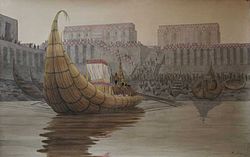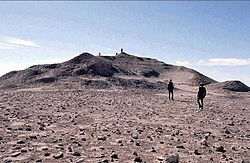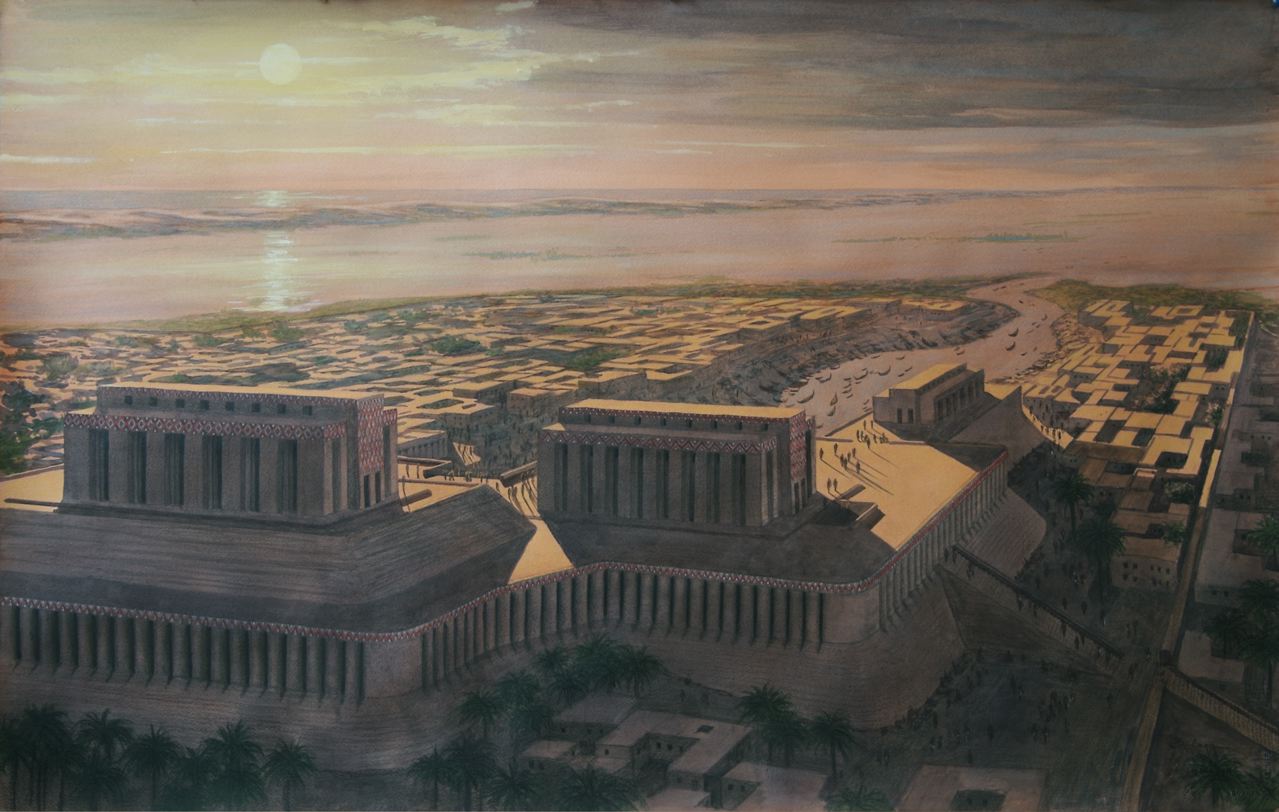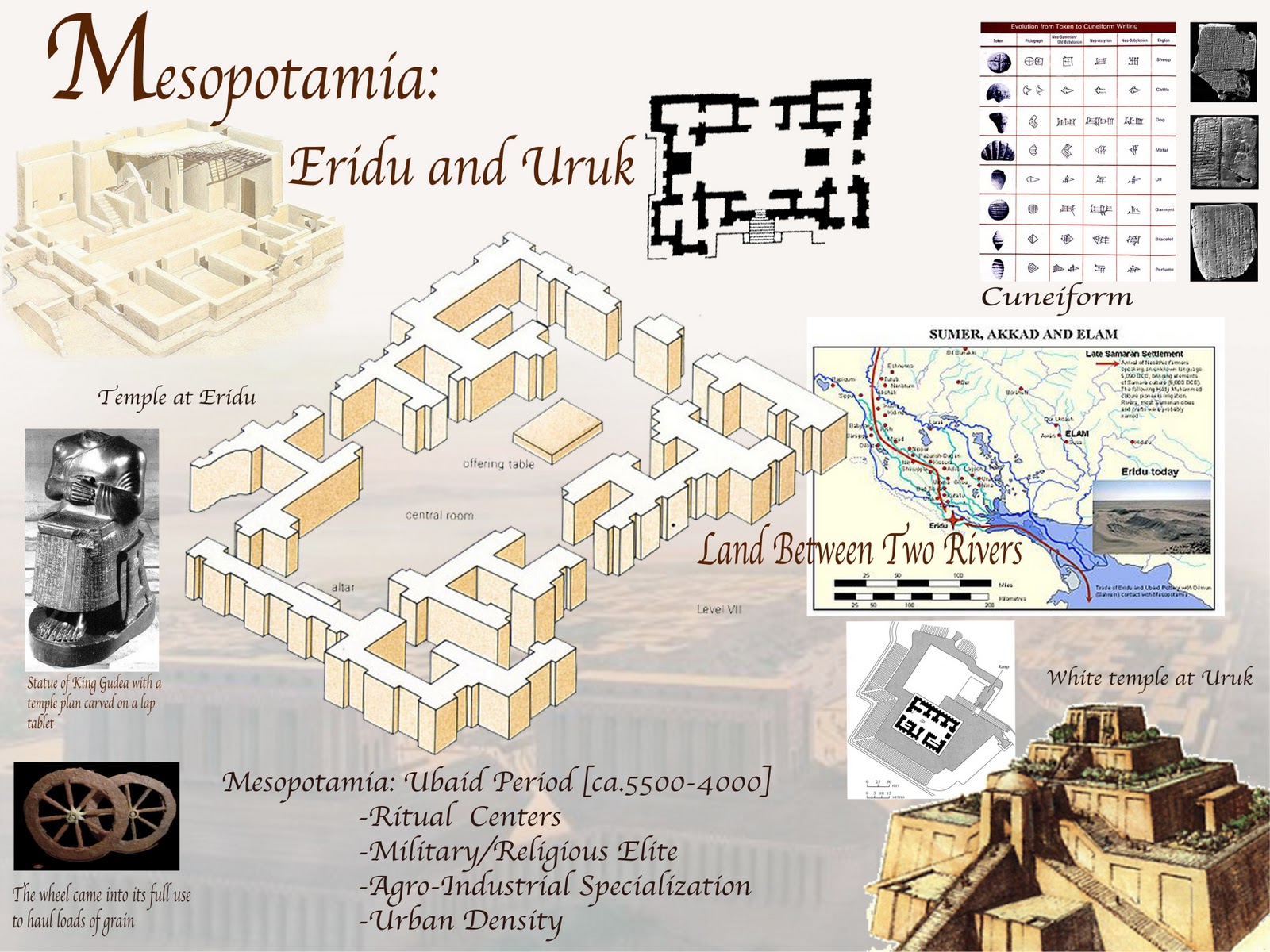



Text source: Wikipedia
ERIDU
Eridu (Cuneiform: NUN.KI Sumerian: eriduki; Akkadian: irГ®tu) is an ancient Sumerian city in what is now Tell Abu Shahrain, Dhi Qar Governorate, Iraq. Eridu was long considered the earliest city in southern Mesopotamia, and is still today argued to be the oldest city in the world.[1] Located 12 km southwest of Ur, Eridu was the southernmost of a conglomeration of Sumerian cities that grew about temples, almost in sight of one another. In Sumerian mythology, Eridu was originally the home of Enki, who was considered to have founded the city, later known by the Akkadians as Ea. His temple was called E-Abzu, as Enki was believed to live in Abzu ("Deep Ocean"), an aquifer from which all life was believed to stem.
Prominence
Eridu, also transliterated as Eridug,[2] could mean "mighty place" or "guidance place". In the Sumerian king list, Eridu is named as the city of the first kings. The king list continues: In Eridu, Alulim became king; he ruled for 28800 years. Alalngar ruled for 36000 years. 2 kings; they ruled for 64800 years. Then Eridu fell and the kingship was taken to Bad-tibira. The king list gave particularly long rules to the kings who ruled before a great flood occurred, and shows how the center of power progressively moved from the south to the north of the country.Adapa U-an, elsewhere called the first man, was a half-god, half-man culture hero, called by the title Abgallu (ab=water, gal=big, lu=man) of Eridu. He was considered to have brought civilization to the city from Dilmun (probably Bahrain), and he served Alulim.
In Sumerian mythology, Eridu was the home of the Abzu temple of the god Enki, the Sumerian counterpart of the Akkadian water-god Ea. Like all the Sumerian and Babylonian gods, Enki/Ea began as a local god, who came to share, according to the later cosmology, with Anu and Enlil, the rule of the cosmos. His kingdom was the waters that surrounded the World and lay below it (Sumerian ab=water; zu=far).
The stories of Inanna, goddess of Uruk, describe how she had to go to Eridu in order to receive the gifts of civilization. At first Enki, the god of Eridu attempted to retrieve these sources of his power, but later willingly accepted that Uruk now was the centre of the land. This seems to be a mythical reference to the transfer of power northward, mentioned above.
Babylonian texts also talk of the creation of Eridu by the god Marduk as the first city, "the holy city, the dwelling of their [the other gods] delight". In the court of Assyria, special physicians trained in the ancient lore of Eridu, far to the south, foretold the course of sickness from signs and portents on the patient's body, and offered the appropriate incantations and magical resources as cures.
History
Recreation of the port at Eridu. According to the Sumerian kinglist Eridu was the first city in the World. The opening line reads, "[nam]-lugal an-ta ГЁd-dГЁ-a-ba [eri]duki nam-lugal-la" "When kingship from heaven was lowered, the kingship was in Eridu."
In Sumerian mythology, it was said to be one of the five cities built before the Deluge occurred. Eridu appears to be the earliest settlement in the region, founded ca. 5400 BC, close to the Persian Gulf near the mouth of the Euphrates River. Because of accumulation of silt at the shoreline over the millennia, the remains of Eridu are now some distance from the gulf at Abu Shahrain in Iraq. According to Gwendolyn Leick,[3] Eridu was formed at the confluence of three separate ecosystems, supporting three distinct lifestyles, that came to an agreement about access to fresh water in a desert environment. The oldest agrarian settlement seems to have been based upon intensive subsistence irrigation agriculture derived from the Samarra culture to the north, characterised by the building of canals, and mud-brick buildings. The fisher-hunter cultures of the Arabian littoral were responsible for the extensive middens along the Arabian shoreline, and may have been the original Sumerians. They seem to have dwelt in reed huts. The third culture that contributed to the building of Eridu was the nomadic Semitic pastoralists of herds of sheep and goats living in tents in semi-desert areas. All three cultures seem implicated in the earliest levels of the city. The urban settlement was centered on an impressive temple complex built of mudbrick, within a small depression that allowed water to accumulate.
Kate Fielden reports "The earliest village settlement (c.5000 BC) had grown into a substantial city of mudbrick and reed houses by c.2900 BC, covering 8-10 ha (20-25 acres). By c.2050 BC the city had declined; there is little evidence of occupation after that date. Eighteen superimposed mudbrick temples at the site underlie the unfinished Ziggurat of Amar-Sin (c.2047вҖ“2039 BC). The finding of extensive deposits of fishbones associated with the earliest levels also shows a continuity of the Abzucult associated later with Enki and Ea. This apparent continuity of occupation and religious observance at Eridu provide convincing evidence for the indigenous origin of Sumerian civilization.[citation needed] Eridu was abandoned for long periods, before it was finally deserted and allowed to fall into ruin in the 6th century BC. The encroachment of neighbouring sand dunes, and the rise of a saline water table, set early limits to its agricultural base so in its later Neo-Babylonian development, Eridu was rebuilt as a purely temple site, in honour of its earliest history.
Link to Wikipedia Source
Text source: Wikipedia
Ш§ШөЩ„ Ш§Щ„ЩҶШө Щ…ЩҶ Щ…ЩҲЩӮШ№ Ш§Щ„ЩҲЩғЩҠШЁЩҠШҜЩҠШ§
Ш§ШұЩҠШҜЩҲ
Ш§Щ„ШұШ§ШЁШ· ЩҒЩҠ Щ…ЩҲЩӮШ№ Ш§Щ„ЩҲЩҠЩғЩҠШЁЩҠШҜЩҠШ§
You are welocome to send your comments and proposals as well any useful photos, documents, links for website update using our following address:
Ш§Щ„ШөЩҒШӯШ© ШӘШұШӯШЁ ШЁШ§ЩҠШ© Щ…Щ„Ш§ШӯШёШ§ШӘ Ш§ЩҲ Щ…ЩӮШӘШұШӯШ§ШӘ ЩғЩ…Ш§ ШӘШӘШ·Щ„Ш№ Щ„Ш§ШіШӘЩ„Ш§Щ… Ш§ЩҠШ© ШөЩҲШұ Ш§ЩҲ ЩҲШ«Ш§ШҰЩӮ Ш§ЩҲ ШұЩҲШ§ШЁШ· Щ…ЩҒЩҠШҜШ© Щ„ШӘШӯШҜЩҠШ«ЩҮШ§ Ш№ШЁШұ Ш§Щ„Щ…ШұШ§ШіЩ„Ш© Ш№Щ„Щү Ш§Щ„Ш№ЩҶЩҲШ§ЩҶ Ш§Щ„Ш§Щ„ЩғШӘШұЩҲЩҶЩҠ Ш§Щ„ШӘШ§Щ„ЩҠ
info@uruk-warka.dk
Other updates ... ШӘШӯШҜЩҠШ«Ш§ШӘ Ш§Ш®ШұЩү
CITY-STATES OF ANCIENT - SUMER ... ШҜЩҲЩ„ Ш§Щ„Щ…ШҜЩҶ ЩҒЩҠ ШіЩҲЩ…Шұ
The British Museum - Ш§Щ„Щ…ШӘШӯЩҒ Ш§Щ„ШЁШұЩҠШ·Ш§ЩҶЩҠ
Eridu Photos - ШөЩҲШұ Щ…ЩҶ Ш§ШұЩҠШҜЩҲ